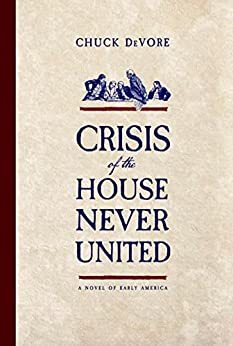Every few months, it seems that the vast majority of Twitter is suddenly comprised of experts in US Constitutional law. Then we slip into a morass of sticky arguments about the role of the government: “Do we want more freedom, or more safety?” “More regulation or less?” “Is it time for a national divorce?” What we may not realize is that these questions have existed in one form or another from the moment of our founding.
While I would never claim to be expert in anything legal, I know enough world history to understand that the US Constitution is unique and the greatest legal document ever written. What I never considered is how US history would be different (or even exist) if it hadn’t been ratified. Precious things tend to be fragile, especially in their infancy. So too with the creation of our system of government.
Which brings us to Crisis of the House never United.
Author Chuck DeVore takes a different approach to alternate history. And given his background serving in both the military and government, he’s more than qualified to reconsider the past and write of battles, both with ballots and bullets (to borrow from the back cover). Usually authors include some fantastic element like a major technological advancement as justification for altering events. The closest thing to which I can compare Crisis of the House Never United is Susanna Clarke's Jonathan Strange & Mr. Norrell, and even that framed its retelling of the Napoleonic Wars with magic.
There's nothing like that here, let me be clear so that so no one quits this book frustrated. Rather, DeVore's novel attempts to answer the question "What would have happened if the Constitution had not been ratified?" Put another way, "What if key players in US history, like Aaron Burr, hadn't miscalculated their opponents?" and "What if (as many of today's generation complain) slavery had been abolished immediately at our founding?"
The answer, it seems, would be a national divorce, an idea that's come into vogue as of late. And it's not pretty.
All history eventually becomes story, and real-life figures morph into characters no more or less real to us than Luke Skywalker or Huckleberry Finn. In an undertaking like this, it falls to the author to research and replicate the once-living men and women in close approximation to how they truly were. The reader can tell that DeVore did his homework as he writes of the time with meticulous detail and authority, so one can safely assume he did the same with Aaron Burr, Alexander Hamilton, Thomas Paine, et al. At the back of the book are copious notes explaining the historical deviations for those without an encyclopedic knowledge of events.
It's frustrating to me that there are so few novels (and films, and TV shows) set during our nation's founding. Having visited Colonial Williamsburg, I know that it was a vibrant and fascinating time. So even though war is hell and this novel speculates a much darker post-Revolutionary War era than the difficult reality, I savored the depictions of day-to-day life.
Through this narrative speculation, we're reminded that this country which the whole world takes for granted has always been poised on the edge of a knife. Sometimes the edge has been a little sharper than at others. There's never been a nation like the United States, and there likely never will be again, for all our successes over the last 250 years. To suggest that we burn it all down and start over, that if we'd been there we would have done better, or that smashing it to pieces now would improve things, is foolish and dangerous.
One small criticism: I wish that DeVore had taken on a co-author schooled in writing fiction just to polish the dialog and narration. The plot flows organically and maintains its logic, yet the writing is sometimes stilted and the dialog awkward. Those flaws take away from the pleasant experience of reading a novel, though the intent here is to be thought provoking more than entertaining.
That aside, I recommend Crisis of the House Never United for anyone who loves the era, or would like some context for how we arrived where we are today and what stands to be lost if we don't fight to preserve it.

























